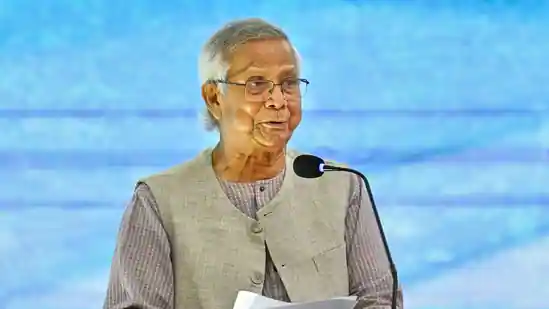Now Reading: Bangladesh’s Yunus Criticizes Sheikh Hasina’s Exile in India, Cites Strained Ties
-
01
Bangladesh’s Yunus Criticizes Sheikh Hasina’s Exile in India, Cites Strained Ties
Bangladesh’s Yunus Criticizes Sheikh Hasina’s Exile in India, Cites Strained Ties

In a recent statement, Bangladesh’s interim government head, Muhammad Yunus, expressed concerns over the current state of bilateral relations with India, attributing the strain to the presence of former Prime Minister Sheikh Hasina in India. Yunus emphasized that Hasina’s stay is exacerbating tensions between the two nations.
Background of the Strained Relations
Sheikh Hasina fled Bangladesh in August 2024 following widespread protests that led to the collapse of her 16-year rule. Since then, she has been residing in India. The interim government in Bangladesh, led by Yunus, has filed multiple criminal cases against Hasina and other former officials, alleging serious charges. These developments have significantly impacted diplomatic relations between Bangladesh and India.
Yunus’s Remarks on Bilateral Tensions
Speaking on the sidelines of the United Nations General Assembly in New York, Yunus stated that Bangladesh is currently facing challenges in its relationship with India due to the latter’s disapproval of the events that led to Hasina’s ouster. He further criticized the hosting of Hasina in India, suggesting that it contributes to the ongoing tensions. Yunus also pointed to the proliferation of misinformation from India, labeling it as propaganda that misrepresents the situation in Bangladesh.
India’s Response and Diplomatic Considerations
India has yet to respond officially to Bangladesh’s requests for Hasina’s extradition. The Indian government maintains that Hasina’s stay is a matter of personal choice and has not commented on the political implications of her presence. The situation remains delicate, with both nations navigating the complexities of their diplomatic ties.
Conclusion
The ongoing issue of Sheikh Hasina’s exile in India continues to be a point of contention in Bangladesh-India relations. As both countries address internal and external challenges, the resolution of this matter will likely play a crucial role in shaping the future of their bilateral interactions.

























